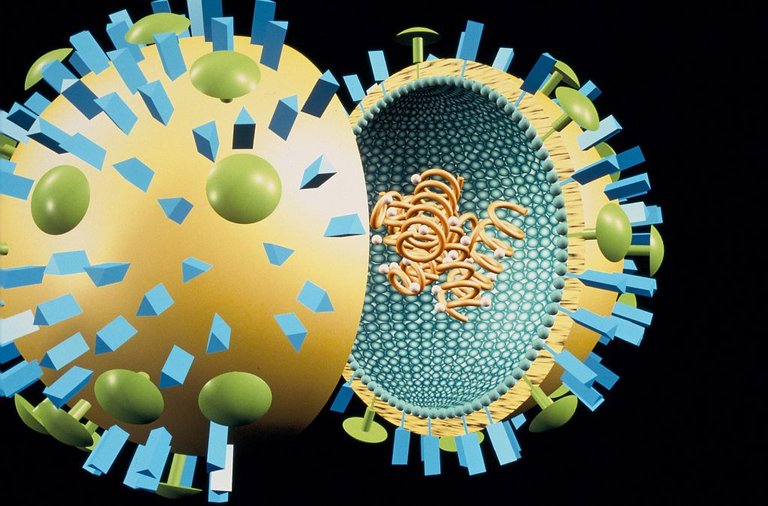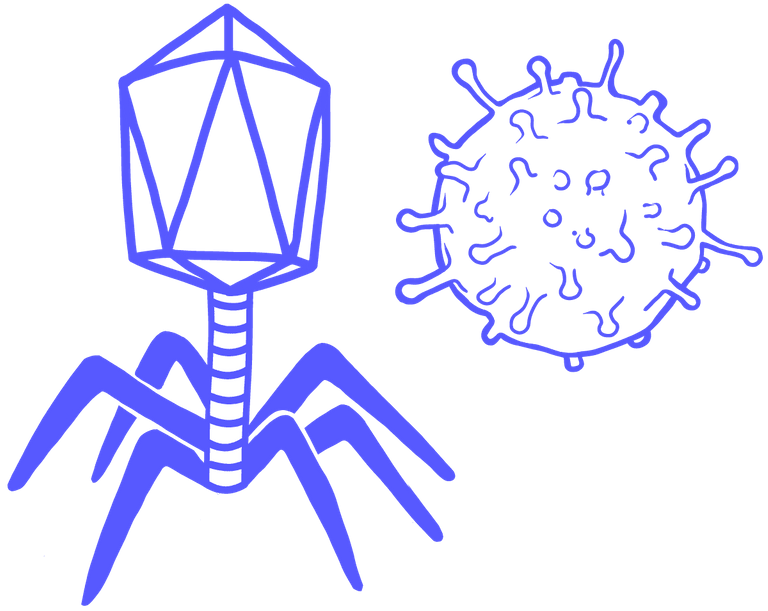Until about 100 years ago, we thought infectious diseases was caused by microorganism like bacteria but then when farmers started to see their tobacco crops rot they believed it was caused by a disease. This led scientists like Dmitri Ivanosky to look for the culprit and you guessed it, bacteria wasn't the cause of the disease. So what could have been the cause? Scientists agreed at the time that it was transmitted through a contagious living fluid and not a bacteria. It was later called a "virus" meaning "poison" by Martinus Beijerinck who was a dutch botanist.
While viruses have a lot of things in common with living things, most scientist will not classify it as one and I am sure you also do not classify it as one. You see, like living things, viruses come in different shapes and sizes, but then they are smaller and simpler than bacteria and the biggest virus are still very small that they can only be seen with a light microscope. While viruses have genes like us living beings, they only exist as nucleic acids with either single or double stranded DNA or RNA which is wrapped in a Capsid which is a protein jacket.
Viruses usually evolve over time, which is why even when your body is immune to one strain of virus, it can become susceptible to the mutated variation of the same virus. Why they are not regarded as living beings is because they cannot grow, reproduce, or produce energy on their own unless they infect a living host. Taking about viruses, each virus can only infest certain type of host like the measles virus that can only infect primate or bacteriophages that can only infect bacteria but they also have exceptions like the virus SARS-CoV-2 virus which infects humans, and animals alike. When virus infect a cell, they spread to more cells in the living organism.
Virus RNA on their own cannot do much but when they infect compatible host cell, it gets its envelope into the host's cell membrane where it fuse into the cell and enter into it after which it shed off its capsid leaving its single strand of RNA causing it to replicate copies of the RNA strand which then acts as messenger RNA (mRNA) that the cell translate into viral protein which then wrap around the other RNA copies to become new viral particles. By the time the virus is done with the replication process, they would have harm or killed the host's cell.
For viruses like retrovirus, the RNA is transformed into DNA via reverse transcriptase enzyme. It then integrates into the host's cell DNA becoming a part of it. Scientists have even said that one tenth of the human cells contain viral DNA from our ancestors which is transferred to us from ancient infections.
Science has began to improve and find way to deal with certain viruses. For instance researchers just opened a new leads in the creation of anti-HIV drug. Researchers from the University of Michigan successfully modified a naturally occurring chemical compound that would interfere with the activity of HIV in-vitro. We hope it works in vivo which is always difficult to replicate but with this, we can say that science is really working hard to be able to deal with virus.
The journey of understanding infectious diseases has been marked by paradigm shifts, with the discovery of viruses which has reshaped our understanding of invisible pathogens. In the past 100 years, we have been able to do a lot with infectious diseases not excluding virus. As we continue to unravel the mysteries of virology, we gain deeper insights into the dynamic relationship between viruses, living organisms, and the broader ecosystems in which we all coexist.
To Read More
- https://www.smithsonianmag.com/science-nature/what-are-viruses-history-tobacco-mosaic-disease-180974480/
- https://www.who.int/news-room/fact-sheets/detail/measles
- https://www.sciencedaily.com/releases/2024/03/240308123251.htm
- https://www.sciencedirect.com/topics/medicine-and-dentistry/tobacco-mosaic-virus
- https://www.nature.com/scitable/topicpage/the-origins-of-viruses-14398218/
- https://www.ncbi.nlm.nih.gov/pmc/articles/PMC8471308/
- https://www.ncbi.nlm.nih.gov/pmc/articles/PMC4424100/
- https://pubmed.ncbi.nlm.nih.gov/20433575/
- https://www.nih.gov/news-events/nih-research-matters/ancient-viral-dna-may-help-humans-fight-infections
- https://www.ncbi.nlm.nih.gov/pmc/articles/PMC7150055/


Viruses are getting so high nowadays in our generation and it is really getting frightening to see how things are working out. Hope the medical scientist will find a way to sort it out
Actually, I have heard of numerous strains of viruses in recent times but it looks like those viruses aren't infecting humans. Science has done a great job in tackling viruses and infectious diseases in general and we hope we are able to do a lot more in the near future.
Thanks for your contribution to the STEMsocial community. Feel free to join us on discord to get to know the rest of us!
Please consider delegating to the @stemsocial account (85% of the curation rewards are returned).
Thanks for including @stemsocial as a beneficiary, which gives you stronger support.